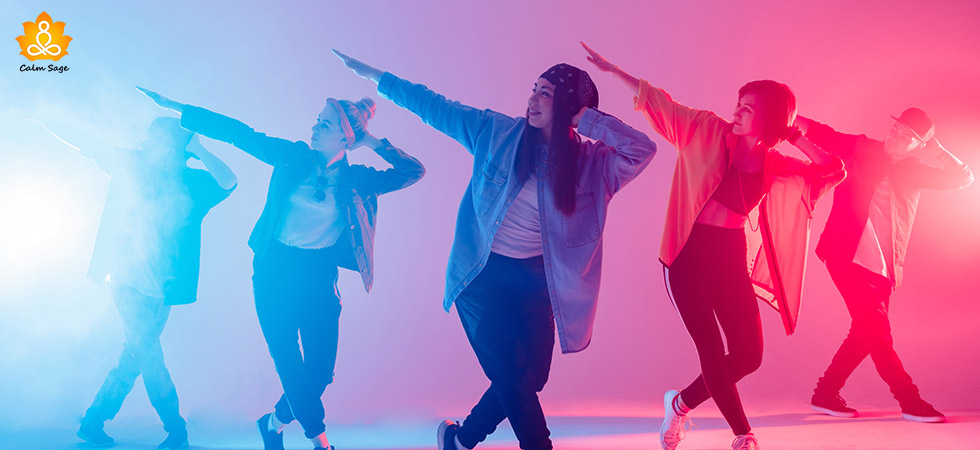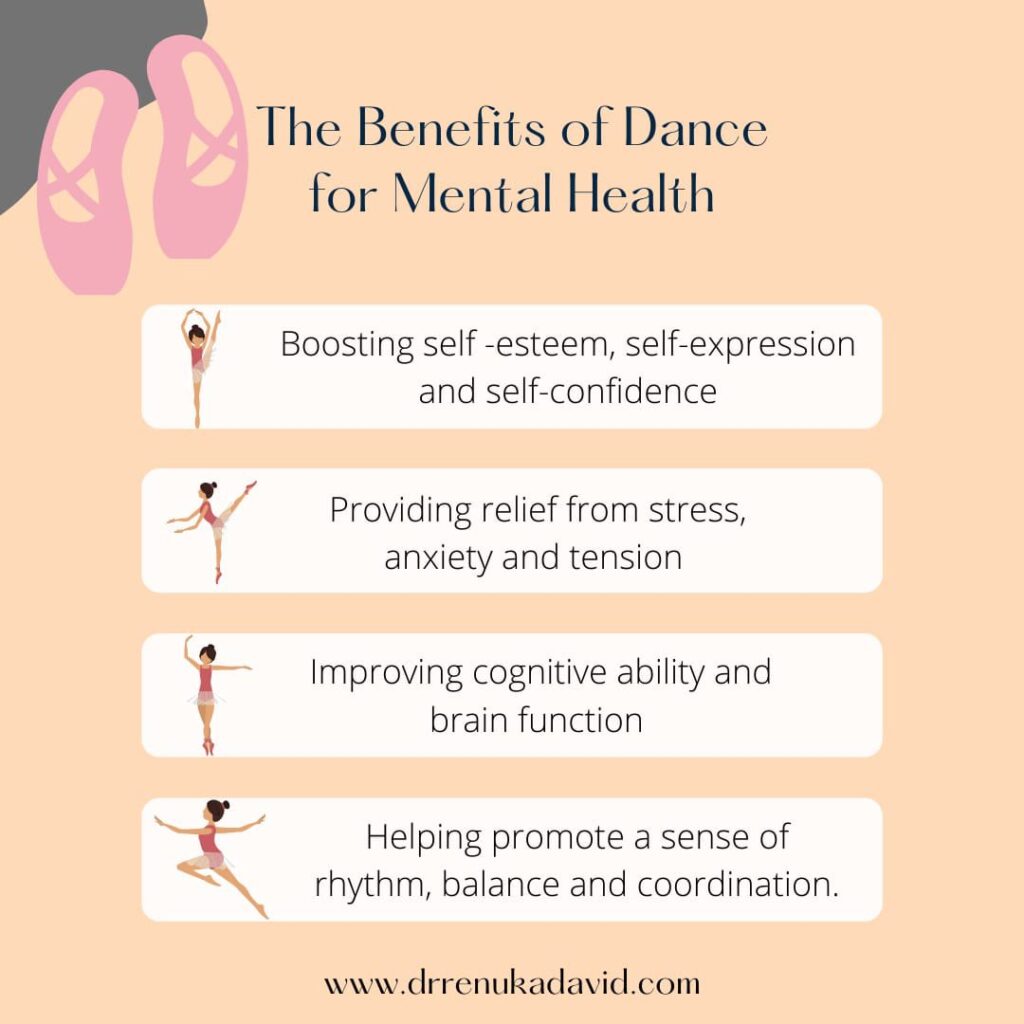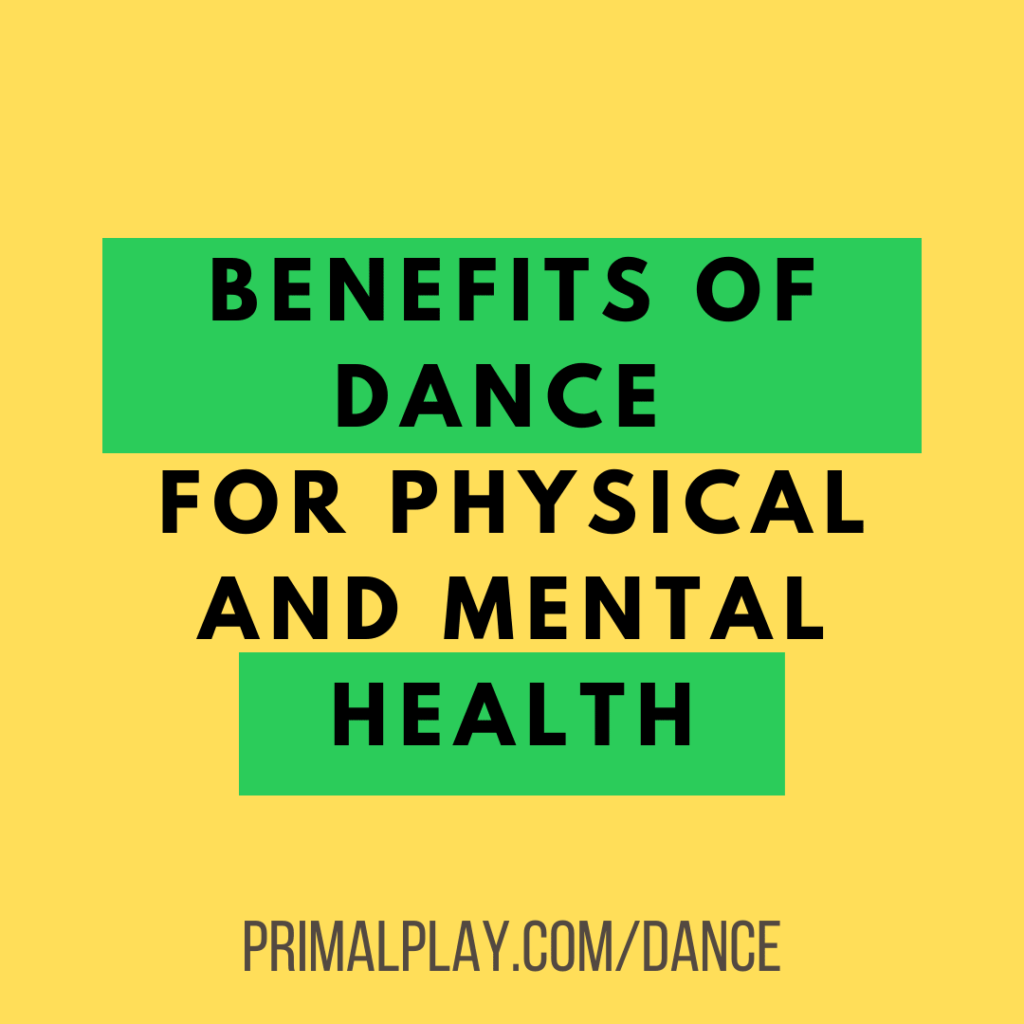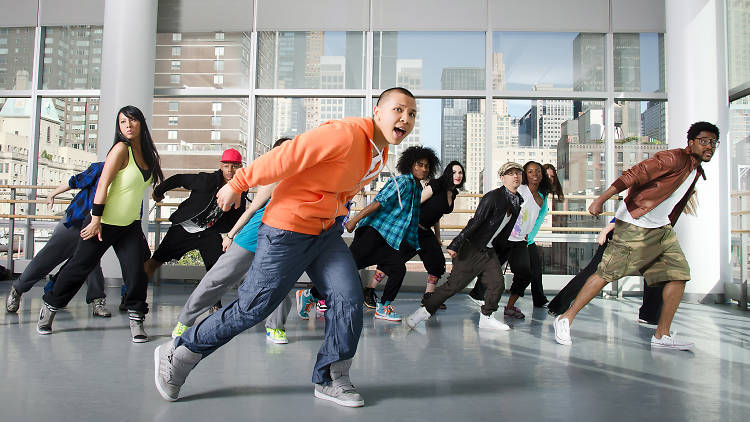Benefits of Dance for Mental Health
Introduction
Dance is not just a form of artistic expression or a physical activity; it also has significant benefits for your mental health. In this article, we will explore the ways in which dance can enhance your overall well-being and provide you with a sense of mental clarity and emotional balance.
Definition of dance
Dance is a rhythmic movement of the body usually performed to music. It encompasses a wide range of styles and techniques, from classical ballet to modern hip hop. Regardless of the style, dance involves coordination, expression, and a deep connection between the mind and body.
Importance of mental health
Maintaining good mental health is crucial for your overall well-being. It affects how you think, feel, and act, influencing every aspect of your life. Dance has been proven to contribute positively to mental health by reducing stress levels, boosting self-esteem, and promoting relaxation. Engaging in dance allows you to express emotions, release tension, and improve your mood.
Link between dance and mental health
Research studies have consistently shown a strong link between dance and mental health. Regular dance practice has been found to reduce symptoms of anxiety and depression, increase cognitive function, and enhance overall psychological well-being. The combination of physical exertion, creative expression, and social interaction involved in dance can have a profound impact on your mental state, leaving you feeling happier, more energized, and better equipped to cope with daily challenges.
By incorporating dance into your life, you can experience the numerous mental health benefits it offers. So, why wait? Get moving and start reaping the mental rewards that dance can bring to your life.

This image is property of www.calmsage.com.
Benefits of dance for mental health
Dance is not only a fantastic way to express yourself creatively, but it also provides numerous benefits for your mental health. Engaging in dance can have a positive impact on your overall well-being, helping to alleviate stress, anxiety, and even depression. Research studies have consistently shown that dance can enhance mental well-being and improve your mood.
Improves self-esteem and confidence
Dance encourages self-expression and allows you to embrace your unique abilities. This can help boost your self-esteem and confidence as you learn new dance moves and techniques. The sense of achievement that comes from mastering a dance routine or performing on a stage can have a powerful effect on your self-image and belief in your own abilities.
Boosts mood and reduces stress
When you dance, your body releases endorphins, which are chemicals that promote feelings of happiness and pleasure. This natural mood booster can help reduce stress and anxiety levels, allowing you to relax and unwind after a long day. The rhythmic movements and music in dance can also serve as a form of meditation, helping to calm the mind and alleviate negative thoughts.
Enhances cognitive function
Dance involves coordination, memory, and concentration. By engaging in dance regularly, you can improve your cognitive function and enhance your mental sharpness. Learning choreography and remembering sequences can stimulate your brain and improve your memory skills. Additionally, dance requires focus and concentration, which can help improve your ability to stay present in the moment and enhance your overall cognitive abilities.
By incorporating dance into your life, you can reap these mental health benefits and enjoy a more balanced and positive state of mind. So why not put on some music, let go of your inhibitions, and dance your way to better mental well-being?
Emotional Benefits of Dance
Dance is not just a physical activity; it also has numerous benefits for your mental well-being. Engaging in dance can have a positive impact on your overall mood, self-esteem, and emotional expression.
Reduces stress and anxiety
One of the key emotional benefits of dance is its ability to reduce stress and anxiety. When you dance, you immerse yourself in the present moment, allowing your mind to focus solely on the movements and rhythm. This helps to distract you from daily worries and clears your mind, promoting a sense of calm and relaxation. Additionally, dance releases endorphins, often referred to as “feel-good” hormones, which can alleviate feelings of stress and anxiety.
Boosts mood and self-esteem
Dancing can significantly boost your mood and enhance your self-esteem. When you dance, your brain releases dopamine, a neurotransmitter associated with pleasure and reward. This release of dopamine can leave you feeling happier and more positive. Moreover, dance provides a sense of accomplishment as you learn and master new movements, which can greatly boost your self-confidence and overall self-esteem.
Promotes self-expression and creativity
Dance offers a unique form of self-expression and creativity. Through movement, you have the opportunity to express yourself without the need for words. Dance allows you to tap into your emotions and convey your feelings through the art of movement. This creative outlet can help you gain a deeper understanding of yourself and provide a platform for emotional release.
engaging in dance can have significant emotional benefits. It can reduce stress and anxiety, boost your mood and self-esteem, and promote self-expression and creativity. So, put on your favorite music and let your body and mind be lifted by the power of dance.

This image is property of countrypridedanceclub.ca.
Cognitive Benefits of Dance
Improves memory and cognitive function
Dance is not only a physical activity; it also offers numerous cognitive benefits that can enhance your mental well-being. One of the key cognitive benefits of dance is the improvement in memory and cognitive function. Engaging in dance requires learning and memorizing choreography, which can help improve your memory skills. Studies have shown that regular dance practice can enhance cognitive function, including attention, concentration, and the ability to recall information.
Enhances neuroplasticity
Neuroplasticity refers to the brain’s ability to reorganize itself and form new neural connections. Dance has been found to enhance neuroplasticity, allowing the brain to adapt and change. When you engage in dance, you are constantly engaging different parts of your brain, such as those responsible for motor coordination, rhythm, and creativity. This constant brain stimulation can contribute to the growth and development of new neural networks, ultimately enhancing overall brain health.
Stimulates brain connectivity
Dance involves complex movements that require coordination between different parts of the body. This coordination stimulates brain connectivity, strengthening the communication between different areas of the brain. When you engage in dance, your brain establishes new pathways and connections, promoting efficient communication and enhancing cognitive function. This improved brain connectivity can have a positive impact on other cognitive abilities, such as problem-solving, decision-making, and multitasking skills.
By incorporating dance into your life, you can experience these cognitive benefits. Dance not only provides a fun and enjoyable way to stay active, but it also offers significant mental health benefits. So put on your dancing shoes and embrace the joy and cognitive boosts that dance can bring to your life.

This image is property of pbs.twimg.com.
Social Benefits of Dance
Dance is not only a physical activity but also a powerful tool for improving your mental well-being. In addition to its many physical benefits, dance can have a profound impact on your social life, fostering connections and creating a sense of belonging within a community.
Fosters social connections and support
When you participate in dance classes or join a dance group, you have the opportunity to meet new people who share your passion for dance. Dancing together provides a platform for meaningful interactions and can help you develop new friendships. It’s a place where you can connect with others, exchange ideas, and provide support to one another throughout your dance journey.
Builds teamwork and cooperation
Dance often involves partnering or dancing in groups, which requires teamwork and cooperation. By working collaboratively with others, you can learn valuable skills such as communication, compromise, and trust. These skills are not only beneficial on the dance floor but can also be applied in various aspects of your life, enhancing your relationships and interactions with others.
Creates a sense of belonging and community
Being part of a dance community cultivates a sense of belonging and unity. When you dance with others who share your love for dance, you become part of a supportive and inclusive group. This sense of community can boost your self-esteem, reduce feelings of loneliness, and provide a safe space where you feel accepted and valued.
dance goes beyond the physical benefits it offers. It also provides numerous social advantages, including fostering social connections and support, building teamwork and cooperation, and creating a sense of belonging and community. So, put on your dancing shoes and experience the joy of dance while enjoying these incredible social benefits!

This image is property of www.calmsage.com.
Dance Therapies for Mental Health
Overview of dance therapy
Dance is not only a beautiful form of self-expression but also a powerful tool for improving mental well-being. Engaging in dance activates both the body and mind, allowing you to release stress, boost your mood, and improve your overall mental health. Whether you’re twirling in ballet or grooving to the rhythm of hip hop, dance therapy offers a myriad of benefits.
Applications in mental health treatment
Dance therapy, a form of expressive therapy, is increasingly recognized for its effectiveness in treating mental health conditions such as anxiety, depression, and PTSD. By integrating movement and music, dance therapy enables individuals to explore their emotions, increase self-awareness, and develop healthy coping mechanisms. It provides a safe and supportive environment for individuals to express themselves, fostering emotional healing and personal growth.
Success stories and research findings
Numerous success stories and research studies highlight the positive impact of dance therapy on mental health. Participants have reported reduced stress levels, improved self-esteem, enhanced emotional regulation, and increased social connections. Studies have shown that dance therapy can stimulate the release of endorphins, the “feel-good” hormones, contributing to an improved mood and overall well-being. Furthermore, dance therapy has been found to improve body image, increase mindfulness, and promote self-expression.
By incorporating dance therapy into your mental health routine, you can unlock the transformative power of movement and dance to support your well-being and foster emotional healing. So why not let your body lead the way to a happier and healthier mind?
Expert Insights and Quotes
Perspectives from psychologists and therapists
Dance has long been recognized as a powerful tool for enhancing mental well-being. According to Dr. Sarah Michaels, a renowned psychologist specializing in dance therapy, “Engaging in dance can have profound effects on our mental health by providing an outlet for self-expression, reducing stress, and increasing self-confidence.” Psychologist Dr. Andrew Johnson also emphasizes the therapeutic benefits of dance, stating, “Moving our bodies rhythmically in a dance routine can promote the release of endorphins, which are natural mood elevators.”
Testimonials from individuals benefiting from dance
Many individuals have experienced the positive impact of dance on their mental health firsthand. Lisa, a dance enthusiast, shares, “Dance has become my sanctuary. It allows me to release any pent-up emotions and helps me feel more grounded and at peace.” Another dancer, Mark, adds, “Being part of a dance community has improved my social connections and boosted my self-esteem. It has become an essential part of my mental well-being.”
Research studies and findings
Numerous research studies have also confirmed the benefits of dance for mental health. A study published in the Journal of Applied Sport Psychology found that regular dance practice can reduce symptoms of anxiety and depression. Another study conducted at the University of California, Los Angeles, revealed that dance classes can improve cognitive function and memory recall. These findings support the notion that dance promotes overall mental wellness.
dance is a valuable tool for enhancing mental health. According to experts, psychologists, and research studies, dance offers an outlet for self-expression, reduces stress, increases self-confidence, and can alleviate anxiety and depression. The testimonials of individuals who have experienced the mental benefits of dance further validate these claims. So why wait? Lace up your dancing shoes and unlock the transformative power of dance for your mental well-being!

This image is property of images.squarespace-cdn.com.
Conclusion
Summary of the benefits of dance for mental health
In conclusion, dance has numerous benefits for your mental well-being. Studies have shown that engaging in dance can help reduce symptoms of anxiety and depression, and improve overall mood and self-esteem. Dance provides a creative outlet for self-expression, allowing you to release emotions and stress through movement. It also promotes the release of endorphins, which are natural mood boosters.
Additionally, dancing can enhance cognitive function and brain health. Learning choreography and coordinating movements with music stimulates the brain, improving memory and concentration. The social aspect of dance also plays a crucial role in mental health by fostering social connections, reducing feelings of loneliness, and providing a sense of belonging and support.
Encouragement to incorporate dance into daily life
Now that you understand the benefits of dance for mental health, it’s time to incorporate it into your daily life. You don’t have to be a professional dancer to reap the rewards. Start by simply dancing to your favorite songs in the comfort of your own home. You can also join dance classes, whether online or in-person, to further enhance the experience. Remember, the key is to have fun and let loose!
Highlighting the importance of prioritizing mental well-being
In today’s fast-paced world, it’s easy to neglect our mental well-being. However, taking care of your mental health is just as important as taking care of your physical health. Dance provides an enjoyable and effective way to prioritize your mental well-being. So, whether you’re feeling stressed, down, or simply want a mood boost, lace up those dancing shoes and let the music guide you to a happier and healthier state of mind.






